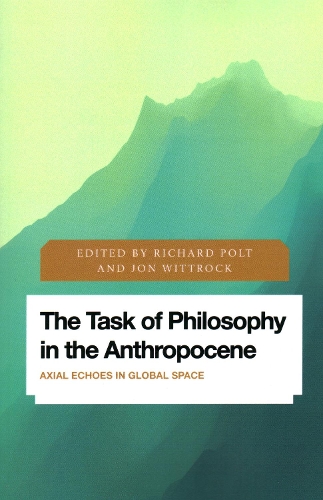
The Task of Philosophy in the Anthropocene: Axial Echoes in Global Space
(Paperback)
Available Formats
Publishing Details
The Task of Philosophy in the Anthropocene: Axial Echoes in Global Space
By (Author) Richard Polt
Edited by Jon Wittrock
Bloomsbury Publishing PLC
Rowman & Littlefield International
22nd November 2021
United Kingdom
Classifications
Professional and Scholarly
Non Fiction
Social and political philosophy
190.9051
Physical Properties
Paperback
246
Width 154mm, Height 220mm, Spine 18mm
376g
Description
In its early modern form, philosophy gave a decisive impetus to the science and technology that have transformed the planet and brought on the so-called Anthropocene. Can philosophy now help us understand this new age and act within it The contributors to this volume take a broad historical view as they reflect on the responsibilities and possibilities for philosophy today.
The term Anthropocene signifies the era of the arrival of human beings as a force that affects global ecosystems in ways that are potentially disastrous for humanity itself, as well as for countless other species. This volume explores whether philosophy has meaningful tasks to fulfill in this unparalleled situation. Do philosophers need to reflect on new topics today Do they need to think in new ways Do they need new relationships to their own tradition And are there concrete actions they should take, over and above philosophical reflection The contributors to this volume thus take on the question of the relevance and responsibility of philosophy, drawing upon diverse legacies, in the current global situation.
Reviews
What is the task of philosophy in the Anthropocene One thing is for certain: we cannot merely rely upon established conceptual systems but rather must think deeply and question boldly as we reconsider what it means to be. This impressive array of axial echoes offers a glimpse of what it would mean to renegotiate human existence in the Anthropocene. -- Casey Rentmeester, Associate Professor of Philosophy, Bellin College, USA
The identification of the Anthropocene brought a new perspective on time and human impact on the environment. Philosophers were major contributors to discussions around the rise of modern technology and the dramatic transformation of the earth in its wake. Their continued contribution to the debate on the human impact on the planet is urgent. This impressive book is an excellent example. -- Bo Strth, Professor Emeritus in Nordic, European and World History, University of Helsinki
Author Bio
Richard Polt is Professor of Philosophy at Xavier University. With Gregory Fried he has translated Heideggers Introduction to Metaphysics and Being and Truth, and edited A Companion to Heideggers Introduction to Metaphysics and Nature, History, State: 1933-1934.
Jon Wittrock is Senior Lecturer in Political Science at Sdertrn University, Sweden.
